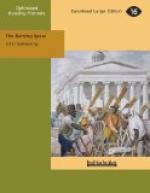“My name is Lavender,” he said resolutely to the young woman. “Is that all right?”
“Quite,” she answered, without looking up.
Mr. Lavender went out slowly, thinking, “I may perhaps have said more in that interview than I remember. Next time I really will insist on having a proof. Or have they taken me for some other public man?” This notion was so disagreeable, however, that he dismissed it, and passed into the street.
On Thursday, the day fixed for his fresh tour of public speaking, he opened the great journal eagerly. Above the third column was the headline: Our vital duty: By A great public man. “That must be it,” he thought. The article, which occupied just a column of precious space, began with an appeal so moving that before he had read twenty lines Mr. Lavender had identified himself completely with the writer; and if anyone had told him that he had not uttered these sentiments, he would have given him the lie direct. Working from heat to heat the article finished in a glorious outburst with a passionate appeal to the country to starve all German prisoners.
Mr. Lavender put it down in a glow of exultation. “I shall translate words into action,” he thought; “I shall at once visit a rural district where German prisoners are working on the land, and see that the farmers do their duty.” And, forgetting in his excitement to eat his breakfast, he put the journal in his pocket, wrapped himself in his dust-coat and broad-brimmed hat, and went out to his car, which was drawn up, with Blink, who had not forgotten her last experience, inside.
“We will go to a rural district, Joe,” he said, getting in.
“Very good, sir,” answered Joe; and, unnoticed by the population, they glided into the hazy heat of the June morning.
“Well, what abaht it, sir?” said Joe, after they had proceeded for some three hours. “Here we are.”
Mr. Lavender, who had been lost in the beauty of the scenes through which he was passing, awoke from reverie, and said:
“I am looking for German prisoners, Joe; if you see a farmer, you might stop.”
“Any sort of farmer?” asked Joe.
“Is there more than one sort?” returned Mr. Lavender, smiling.
Joe cocked his eye. “Ain’t you never lived in the country, sir?”
“Not for more than a few weeks at a time, Joe, unless Rochester counts. Of course, I know Eastbourne very well.”




